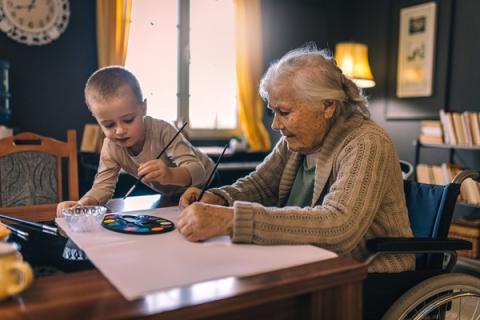Medication Safety for Grandparents
According to the Centers for Disease Control and Prevention (CDC), almost 40% of children treated for medication ingestion in emergency rooms took their grandparent’s medication. And it’s not just happening when the kids go to visit grandma and grampa. The Michigan Poll on Healthy Aging reports that 80% of grandparents keep their medication in its usual location when the grandkids visit. And 72% of grandparents keep medications in their purse or bag when they go visit the grandkids. These facts highlight why proper medication safety is essential when grandkids come to visit.
Why grandparents’ homes present unique risks
Children are naturally curious explorers, and medications can look surprisingly appealing to young eyes. Colorful pills might resemble candy, and liquid medications often come in bright, attractive packaging. Unfortunately, grandparents’ homes often present higher risks than parents’ homes for several reasons:
More medications present: Many grandparents take multiple medications for various health conditions, meaning there are simply more opportunities for accidental ingestion.
Different storage habits: Grandparents may keep medications in easy-to-reach locations like kitchen counters, bedside tables, or pill organizers that aren’t child-resistant.
Unfamiliar environment: Children may be less supervised in an unfamiliar space, and grandparents might not be aware of all the places curious children can reach.
Relaxed vigilance: The special nature of grandparent visits might lead to more relaxed supervision, creating opportunities for children and teens to explore unsupervised.
Prevention is the best medicine
Before having the grandkids over to visit, grandparents should conduct a “medication audit.” Walk through the house and make note of all the areas where medication is stored. Don’t forget about purses and bags, guest bathroom cabinets, and car glove compartments. It’s not a bad idea to invest in a locking medication cabinet. These are available online and at most pharmacies.
And finally, know what to do if your medications do get into the wrong hands. Post the Poison Control Center number (1-800-222-1222) somewhere visible, and program it into your phone. Familiarize yourself with signs of medication poisoning, including drowsiness, confusion, vomiting, difficulty breathing, or unusual behavior. And make sure you are familiar with the current standards of care. Poison control standards are updated frequently. For example, ipecac syrup is no longer recommended like it was in the 1960s. If grandparents need a refresher on how to keep their medications safely out of little hands and mouths, UpAndAway.org is a trusted initiative from the CDC. The site has medication safety resources for grandparents, adults, and kids.
Keeping grandchildren safe while they visit doesn’t mean eliminating all the fun and freedom that makes grandparents’ houses special. It simply means being thoughtful and proactive about potential dangers. By taking medication safety seriously, you’re ensuring that your home remains a place of joy and wonder—not worry.
